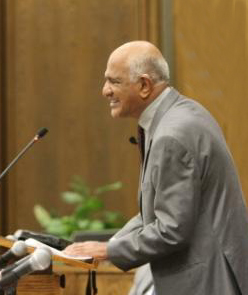Justice Zakeria Mohammed Yacoob at Symposium Opening Session

Heidi Carmack
BYU Law School Reporter
South Africa’s Justice Zakeria Mohammed Yacoob was the keynote speaker in the opening session of the 18th Annual International Center for Law and Religion Studies Symposium, “Religious Freedom in a Pluralistic Age: Trends, Challenges and Practices.’ Justice Yacoob called listeners to action, stating that all people have the potential to add value in this critical fight for religious freedom.
“Religion, conscience, thought and belief should, I believe, be regarded as the core of our humanity as a crucial component of our humanness,” Justice Yacoob said. “They are indeed so crucial and so essential that I doubt whether we would be able to call ourselves human beings without them.”
The BYU Law School’s Moot Court room was filled to capacity, with translation in ten languages. Justice Yacoob, blind as a result of meningitis at 16 months old, greeted all of the listeners warmly. He first addressed the tendency of people to consider their own beliefs superior to that of others’ and the way freedom of religion should be protected regardless of the religion.
“It should not matter… whether the religion is one which has been practiced for a long time or is new, which is practiced by the vast majority of people in a particular country or whether it falls in the category of being a traditional religion or not,” Justice Yacoob said. “All religions must be treated equally.”
Justice Yacoob called listeners to action in fighting for religious freedom without feeling a need to first legitimize their religious beliefs, especially for minority groups. He called for a protection of both religious belief or thought and religious practice.
“There is religious oppression in many parts of the world,” Justice Yacoob said. “The protection of people who represent minorities or who are vulnerable is fundamental to a democratic constitutional order. It is an important change of perspective from the dubious concept of the law of the jungle or, to put it another way, the inhumane notion that ‘might is right’. And we care for vulnerable people and protect them not for their sakes but for ours.”
Justice Yacoob noted that the issues discussed during the Symposium, by more than 70 delegates from 37 countries, are matters significant to the attainment of peace.
“I look forward to the world where every human being will internalize the proposition that our common humanity is paramount and that every human being has the potential to add value irrespective of the religion to which that human being belongs.”